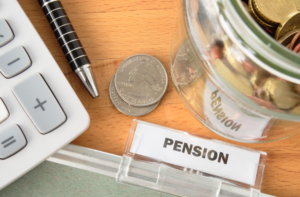
Does everyone get the State Pension?
Not everyone is paid a State Pension. Major changes were made to the UK State Pension system in 2016, which is why the current system is called the New State Pension. In order to claim New State Pension payments when you reach the qualifying age, you will need to have made NICs in at least 10 separate tax years. You will get more money for every additional year of NICs on your record, up to a maximum of 35.
It is important to remember that no one is paid the State Pension automatically. Instead, you will need to apply once you reach the qualifying age. The easiest way to claim is online, which you can do from three months before you hit the qualifying age.
Will I get a full State Pension?
To claim the full amount you will require 35 years of NICs. If you have less than 35 years of NICs, but more than the minimum of 10, your New State Pension payments will be calculated by dividing the full amount by 35, then multiplying by your number of qualifying years of NICs.
You can fill out any gaps in your record by paying voluntary contributions or through the National Insurance credit system. National Insurance Credits are designed to ensure those unable to work for certain reasons do not have any gaps in their record. You can also qualify if you do not earn enough to pay National Insurance or you are looking after a child under 12 years old.
To pay voluntary contributions you need to check your National Insurance record by logging into the government's online State Pension portal. You can then see what gaps you have and how much you need to pay to get a qualifying year of NICs. There is a limit on how far you can go back, however, as well as a deadline for when you need to make the payments. We cover topping up you NICs in our article 'How to fill gaps in your National Insurance record to boost your State Pension'.
When will I get a State Pension?
You will be able to claim State Pension payments once you reach the State Pension age, if you have enough years of NICs. The official State Pension age is set by the government. The current qualifying age is 66, but this may not be the age you are able to claim State Pension payments. This is because the qualifying age is rising and is set to rise to 67 by 2028, so by the time you hit 66 it could be 67, 68 or even older.
You can check your estimated State Pension age here.
Will the State Pension increase each year?
State Pension payments rise every year. The rate of increase is calculated using the triple lock system. At the start of the new tax year in April, State Pension payments increase by the highest of three figures: September’s CPI (Consumer Price Index) rate of inflation, the average increase in earnings, or 2.5%.
The triple lock was suspended for the April 2022 increase and replaced with a ‘double lock’ that excluded average earnings. The government resumed the full triple lock rules for the increase to State Pensions in 2023, increasing by 10.1%, September 2022's rate of inflation. In 2024, the State Pension payments rose by 8.5%, the wage growth figure is for the three months to July 2023.
You can find out more about how this system works and what the future may hold by reading our article ‘What is the State Pension triple lock?’.
When is the State Pension age increasing?
The State Pension age is set to rise to 67 by 2028 and 68 between 2044 and 2046, but it could be increased much earlier. You can find out what your State Pension age is likely to be by filling in your details on the government calculator, though keep in mind that your State Pension age could change by the time you reach retirement.
The age rises are usually justified by the fact that the UK’s average age is also rising. Previous State Pension ages were set when general life expectancy was lower, so the government's logic is essentially that we should retire later because we live longer. There has been some public pushback to increasing the State Pension age, most notably from women who have seen their State Pension age rise from 60 in 2010 to the current level of 66. Raising the State Pension age also saves the government a significant amount of money, as fewer people become eligible to claim it.
State Pension value
New State Pension payments increased by 8.5% in April 2024 to a total of £221.20 per week for the 2024/25 tax year. Basic State Pension payments also rose by 8.5% in April to £169.50 per week.
You may get more than this if you paid into an Additional State Pension, also known as the State Second Pension or SERPS. Even though none of these schemes are active, your pension can still be boosted if you paid in during your working life.
Your State Pension payments could also go up if you qualify for Pension Credit. This is designed to help pensioners who can only claim part of the full amount and who have no other income. It can increase your weekly payments up to £218.15 if you’re single, or your joint weekly income to £332.95 if you live with a partner. You can find out more about Pension Credit eligibility here.
State Pension payments also go up if you defer the point at which you claim. You do not need to claim State Pension payments just because you have reached the qualifying age. Instead, you could opt to defer payments. If you defer by at least nine weeks, the amount you are eventually paid will rise by 1% for each nine week period.
Find out more about the State Pension in our article ‘How much is the UK State Pension?’. For more information on how you can boost your State Pension, read our article '7 tips on how to boost your State Pension'.
Will I get a State Pension forecast?
It is easy to find out when you will be able to start claiming State Pension payments through the government website. You will need to log in using your Government Gateway user ID. It will tell you the date you can get your State Pension and the maximum amount you can be paid, though both may change before you reach the qualifying age.
Should I pay into a private pension?
For many people, State Pension payments will not be enough to cover their expenses in retirement. They may also find that the qualifying age is a lot older than their desired retirement age. Private pensions are often used to bridge the gap between the point at which someone stops working and the age they qualify for State Pension payments. It can also combine with State Pension payments to form a healthy retirement income. You can find out more by reading our article ‘How do private pensions work?’.




